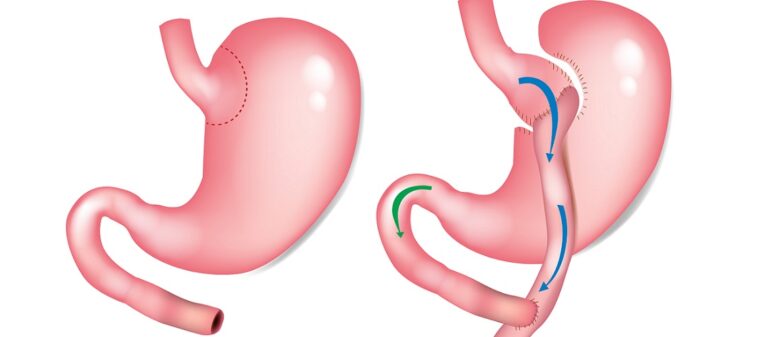Table of Contents
In this article, we’ll discuss the advantages and disadvantages of the gastric bypass. However, it’s important to note that it is not the most suitable surgical technique for all cases of obesity. Only a bariatric surgeon can indicate the most appropriate solution for your particular case.
What is a gastric bypass?
Gastric bypass is a bariatric surgery procedure that is increasingly becoming a solution for weight loss in obese patients.
By altering the digestive system, this procedure can induce significant changes in nutrient absorption and appetite control.
When the gastric bypass is applied, the stomach is divided to create a smaller pouch. After this division of the stomach, the small intestine is divided and a new connection is established between the small gastric pouch created and the intestine.
The main purpose of gastric bypass is to limit the amount of food that can be eaten and reduce calorie absorption. As a result, the patient generally experiences significant weight loss.

Advantages of gastric bypass
Gastric bypass is the most used bariatric procedure worldwide. Some of its advantages include:
Significant weight loss: It has been proven that gastric bypass is one of the most efficient methods for short- and long-term weight loss. Since this procedure involves the creation of a small gastric bag, limiting the amount of food that the patient can eat in a single meal, there is a greater feeling of satiety, which can help in the control of calorie intake and consequently, in weight loss. Patients undergoing this surgery experience a sharp decrease in body mass index (BMI) that normally persists over time.
Improvement of obesity-related medical conditions: In addition to weight loss, gastric bypass can also help improve obesities-associated medical comorbidities, such as type 2 diabetes, hypertension, sleep apnea, and heart disease. In many cases, gastric bypass can even result in partial or total remission of type 2 diabetes, making it an attractive option for obese patients with this condition. Some studies also report that, after the gastric bypass surgery, overall long-term mortality decreases significantly (compared to obese people who do not perform surgery), those due to diabetes, heart disease and cancer;
Improved quality of life: Patients undergoing gastric bypass, often report improvements in quality of life, including increased mobility, reduced back and joint pain, as well as increased levels of energy and self-esteem.
Minor post-surgical complications: Generally speaking, patients undergoing gastric bypass have few post-surgical complications, which is especially true when the procedure is performed by laparoscopy (this is the preferred technique used at Living Clinic).
Disadvantages of gastric bypass
Like any other surgical technique, gastric bypass also has some risks and disadvantages:
It is irreversible: It is important to highlight that gastric bypass is a complex and irrevocable procedure, so once the surgery is performed, it is not possible to “delete it”, except in very extreme cases.
Post-surgical risks: Like any surgical procedure, gastric bypass has risks, including infections, bleeding, respiratory problems, and very rare complications related to anesthesia. Medical advances have significantly reduced these risks, but they must be taken into account when making a decision.
Nutritional Deficiencies: Modification of the digestive system can lead to nutritional deficiencies, especially essential vitamins and minerals. Patients should be monitored regularly and eventually supplemented to prevent these deficiencies. We recommend monitoring by a nutritionist.
Permanent Food Restrictions: Gastric bypass requires patients to follow a restrictive diet after surgery, avoiding certain foods and drinks. This continuous commitment to lifestyle and diet changes after surgery can be challenging for some people.
Side effects: Some patients may notice side effects for some time after surgery, such as dumping syndrome. This occurs when food quickly passes through the stomach, causing uncomfortable symptoms such as nausea, dizziness, and diarrhea. Fortunately, in most cases, this change is not permanent and tends to improve over time. Typically, the symptoms of dumping syndrome decrease as the patient adjusts to his new diet and to a different lifestyle.
Who is a gastric bypass suitable for?
Gastric bypass may be indicated for people with morbid obesity or severe pathologies associated with obesity, such as type 2 diabetes, hypertension, sleep apnea, among others.
It is most suitable for patients with a body mass index (BMI) greater than 35 kg/m2 or a BMI of 30-34.9 kg /m2, associated with obesity-related diseases (as previously mentioned). Exceptions are increasingly accepted, but these cases will have to be discussed in a multidisciplinary manner.
Surgery is indicated in cases where diet and exercise have not been effective, or when other non-surgical medical treatments have not had the desired results.
Although the age of 18 to 60 aren’t restricted to surgical treatment, studies show that patients under the age of 18 or over 65 years, after proper evaluation, may also be candidates for surgery. Therefore, the age factor, by itself, is not an objection to intervention.
It is important to point out that this surgery is a complex and irreversible procedure, and should only be indicated after a complete evaluation of the patient by a medical team specialized in bariatric surgery.
Similarly, before surgery, the patient should be evaluated by a multidisciplinary team, which includes doctors, nutritionists and psychologists, in order to ensure that he’s physically and emotionally prepared for surgery and able to follow postoperative guidelines.
Which doctor does bariatric surgery with Gastric Bypass?
Bariatric surgery, whether through Gastric Bypass or Gastric Sleeve, is performed by a bariatric surgeon, who is a general surgeon with specialization in bariatric surgery.
In the case of Living Clinic, the bariatric surgery team is led by Dr. Luís Sá Vinhas.
Gastric Bypass: Before and After
Bariatric surgery with gastric bypass (reduction of 40kg)
Cristina underwent bariatric surgery with gastric bypass. Initially hesitant, she finally decided to look for an obesity clinic. He weighed about 97 kg and with the surgery she lost about 40 kg, now weighing 57 kg.
“Thanks to the whole team for the second chance to live a full life.”

Learn more in: Bariatric Surgery Before and After
Bariatric surgery with gastric bypass (reduction of 35kg)
The clinical case of Elisangela Menezes, highlights the importance of a competent bariatric evaluation. After surgery in Spain, through a method without scientific evidence, he gained weight and reached 103 kg. He went to our team for an endoscopy and asked about surgery. After bariatric surgery with gastric bypass, she lost 35 kg in eight months, stabilizing at 68 kg.

Learn more in: Gastric Bypass Before and After
Responsible doctor

[Medical License #34266]
Dr. Luís Sá Vinhas is a specialist in General Surgery, with a degree in Medicine from the School of Medicine of the University of Oporto, where he has been a professor since 1995. Since 2017 he has been the Head of the Emergency Unit Team at Centro Hospitalar de São João in Porto.
He has 20 years of surgical experience with special emphasis on Endocrine and Cervical pathology (thyroid, parathyroid, adrenal, salivary glands, congenital lesions of the neck). Extensive experience in laparoscopic surgery, including bariatric surgery.
Author and co-author of multiple scientific communications, both in scientific journals and in national and international scientific congresses and meetings.
Member of the Specialty College of General Surgery of the Portuguese Medical Association. Member of the Portuguese Society of Endocrinology, Diabetes and Metabolism.
Schedule an Appointment
- Are you looking for more information about a specific treatment?
- Would you like to learn more about Living Clinic?
- Would you like to receive the opinion of our specialists?
- Are you interested in scheduling a consultation?






